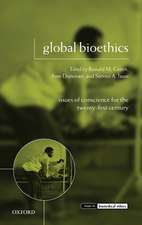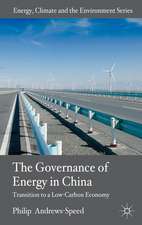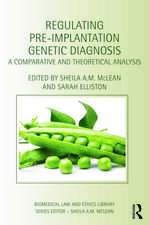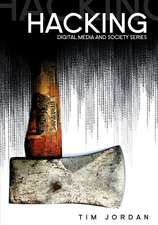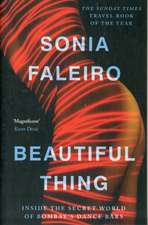Mendel's Ark: Biotechnology and the Future of Extinction
Autor Amy Lynn Fletcheren Limba Engleză Paperback – 22 sep 2016
Mendel's Ark considers the ethical, cultural and social implications of using these tools for wildlife conservation. Drawing upon sources ranging from science to science fiction, it focuses on the stories we tell about extinction and the meanings we ascribe to nature and technology.
The use of biotechnology in conservation is redrawing the boundaries between animals and machines, nature and artifacts, and life and death. The new rhetoric and practice of de-extinction will thus have significant repercussions for wilderness and for society. The degree to which we engage collectively with both the prosaic and the fantastic aspects of biotechnological conservation will shape the boundaries and ethics of our desire to restore lost worlds.
| Toate formatele și edițiile | Preț | Express |
|---|---|---|
| Paperback (1) | 631.21 lei 6-8 săpt. | |
| SPRINGER NETHERLANDS – 22 sep 2016 | 631.21 lei 6-8 săpt. | |
| Hardback (1) | 637.28 lei 6-8 săpt. | |
| SPRINGER NETHERLANDS – oct 2014 | 637.28 lei 6-8 săpt. |
Preț: 631.21 lei
Preț vechi: 742.60 lei
-15% Nou
Puncte Express: 947
Preț estimativ în valută:
120.78€ • 126.36$ • 100.33£
120.78€ • 126.36$ • 100.33£
Carte tipărită la comandă
Livrare economică 03-17 aprilie
Preluare comenzi: 021 569.72.76
Specificații
ISBN-13: 9789401777636
ISBN-10: 9401777632
Pagini: 107
Ilustrații: VIII, 99 p. 10 illus.
Dimensiuni: 155 x 235 x 6 mm
Greutate: 0.16 kg
Ediția:Softcover reprint of the original 1st ed. 2014
Editura: SPRINGER NETHERLANDS
Colecția Springer
Locul publicării:Dordrecht, Netherlands
ISBN-10: 9401777632
Pagini: 107
Ilustrații: VIII, 99 p. 10 illus.
Dimensiuni: 155 x 235 x 6 mm
Greutate: 0.16 kg
Ediția:Softcover reprint of the original 1st ed. 2014
Editura: SPRINGER NETHERLANDS
Colecția Springer
Locul publicării:Dordrecht, Netherlands
Cuprins
1 The Future of Extinction
1.1 Goodbye to the Baiji
1.2 Hello to the Anthropocene
1.3 Wicked Problems and Socio-Technical Imaginaries
1.4 Telling Stories about Extinction
1.5 Taking Control of Nature’s Realm
1.6 The Once and Future Baiji
References
2 A Political History of Extinction
2.1 From Eden to Extinction. . . and Back Again?
2.2 Fossils and Frontiers: Debating ExtinctionDuring the Enlightenment
2.3 The Politics of Extinction in the Progressive Era
2.4 Spaceship Earth: Twentieth Century Environmentalism
2.5 Climate, Catastrophe and Conservation Biology
2.6 Everything Old is New Again: Biotechnology and De-Extinction References
3 Bio-Inventories: The Digitization of Nature
3.1 They Had to Count Them All: Bioinformatics and DNA Barcoding
3.2 Cracking the Code of Life: Bioinformatics in the Twentieth Century
3.3 The Encyclopaedia of Life
3.4 A Barcode for Every Species
3.5 Digital Natures
References .
4Bio-Interventions: Cloning Endangered Species as Wildlife Conservation
4.1 Is Nature Over?
4.2 The Molecular Frontier: Biotechnology and Life as Code
4.3 FromWistar Rats to Oncomice: Engineering Animals
4.4 Dolly and Polly: Animal Cloning Hits the Big Time
4.5 Noah’s Ark: Cloning on the Edge of Extinction
4.6 Preservation in a Petri Dish
References . 5 Bio-Identities: Cloning the Recently Extinct
5.1 Liminal Lives: The Biopolitics of De-extinction .
5.2 The Past Comes Alive: Ancient DNA as Time Travel
5.3 Tasmanian Tiger Tales
5.4 Spectacular Science
5.5 Pickled Pups and Promises
5.6 Reviving and Restoring5.7 See It Now, While It’s Still Extinct References
6 Bio-Imaginaries: Bringing Back the Woolly Mammoth
6.1 Entering the Hall of Extinct Monsters
6.2 How to Resurrect a Woolly Mammoth
6.3 Engineering Life: Synthetic Biology
6.4 In Search of Lost Worlds
References
1.1 Goodbye to the Baiji
1.2 Hello to the Anthropocene
1.3 Wicked Problems and Socio-Technical Imaginaries
1.4 Telling Stories about Extinction
1.5 Taking Control of Nature’s Realm
1.6 The Once and Future Baiji
References
2 A Political History of Extinction
2.1 From Eden to Extinction. . . and Back Again?
2.2 Fossils and Frontiers: Debating ExtinctionDuring the Enlightenment
2.3 The Politics of Extinction in the Progressive Era
2.4 Spaceship Earth: Twentieth Century Environmentalism
2.5 Climate, Catastrophe and Conservation Biology
2.6 Everything Old is New Again: Biotechnology and De-Extinction References
3 Bio-Inventories: The Digitization of Nature
3.1 They Had to Count Them All: Bioinformatics and DNA Barcoding
3.2 Cracking the Code of Life: Bioinformatics in the Twentieth Century
3.3 The Encyclopaedia of Life
3.4 A Barcode for Every Species
3.5 Digital Natures
References .
4Bio-Interventions: Cloning Endangered Species as Wildlife Conservation
4.1 Is Nature Over?
4.2 The Molecular Frontier: Biotechnology and Life as Code
4.3 FromWistar Rats to Oncomice: Engineering Animals
4.4 Dolly and Polly: Animal Cloning Hits the Big Time
4.5 Noah’s Ark: Cloning on the Edge of Extinction
4.6 Preservation in a Petri Dish
References . 5 Bio-Identities: Cloning the Recently Extinct
5.1 Liminal Lives: The Biopolitics of De-extinction .
5.2 The Past Comes Alive: Ancient DNA as Time Travel
5.3 Tasmanian Tiger Tales
5.4 Spectacular Science
5.5 Pickled Pups and Promises
5.6 Reviving and Restoring5.7 See It Now, While It’s Still Extinct References
6 Bio-Imaginaries: Bringing Back the Woolly Mammoth
6.1 Entering the Hall of Extinct Monsters
6.2 How to Resurrect a Woolly Mammoth
6.3 Engineering Life: Synthetic Biology
6.4 In Search of Lost Worlds
References
Recenzii
“This book looks at the impacts of modern molecular techniques on biodiversity and extinction. … The information presented is clear and concise, providing relevant examples for the issues at hand. … Summing Up: Recommended. Upper-division undergraduates and above in biology, ecology, and biodiversity.” (K. R. Thompson, Choice, Vol. 52 (8), April, 2015)
Textul de pe ultima copertă
Does extinction have to be forever? As the global extinction crisis accelerates, conservationists and policy-makers increasingly use advanced biotechnologies such as reproductive cloning, polymerase chain reaction (PCR) and bioinformatics in the urgent effort to save species.
Mendel's Ark considers the ethical, cultural and social implications of using these tools for wildlife conservation. Drawing upon sources ranging from science to science fiction, it focuses on the stories we tell about extinction and the meanings we ascribe to nature and technology.
The use of biotechnology in conservation is redrawing the boundaries between animals and machines, nature and artifacts, and life and death. The new rhetoric and practice of de-extinction will thus have significant repercussions for wilderness and for society. The degree to which we engage collectively with both the prosaic and the fantastic aspects of biotechnological conservation will shape the boundaries and ethics of our desire to restore lost worlds.
Mendel's Ark considers the ethical, cultural and social implications of using these tools for wildlife conservation. Drawing upon sources ranging from science to science fiction, it focuses on the stories we tell about extinction and the meanings we ascribe to nature and technology.
The use of biotechnology in conservation is redrawing the boundaries between animals and machines, nature and artifacts, and life and death. The new rhetoric and practice of de-extinction will thus have significant repercussions for wilderness and for society. The degree to which we engage collectively with both the prosaic and the fantastic aspects of biotechnological conservation will shape the boundaries and ethics of our desire to restore lost worlds.
Caracteristici
Combines science, technology and society studies with environmental studies, giving a new view on the problem of species extinction and the biodiversity crisis Will appeal to scholars in such emerging areas as animal studies and post-humanities, as well as established disciplines such as political science and anthropology Broadens the study of the life sciences from health and medical applications to the environment and wildlife preservation Engages with a the significant, controversial and highly visible new rhetoric of "de-extinction" Includes supplementary material: sn.pub/extras

